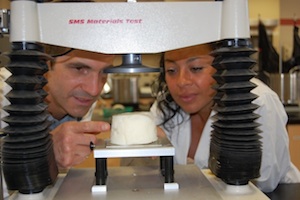
Food cluster prompts support for university’s research
October 24, 2013
By Bakers Journal
 Oct. 24, 2013, ON – The Ontario Food Cluster (OFC) is encouraging global agri-food and beverage firms to set up subsidiaries that can take advantage of University of Guelph’s research programs.
Oct. 24, 2013, ON – The Ontario Food Cluster (OFC) is encouraging global agri-food and beverage firms to set up subsidiaries that can take advantage of University of Guelph’s research programs.
Formed in 2011, the OFC builds international trade and investment opportunities for the agri-food and beverage industries. In addition, to further grow the industry OFC was at Anuga to raise global awareness.
Interested companies can take advantage of University of Guelph research programs that produce partnership and licensing opportunities on innovations like free of trans fat shortening, water soluble food ingredients and soy cheese that is close in texture to traditional cheese among others.
The following innovations were presented at this year's Anuga:
1. Soy products are increasingly accepted in western society because of their health benefits and because soy ingredients have good processing functionality. University of Guelph researchers say they have developed a method to mingle milk and soy proteins in the cheese-making process to achieve the health benefits and cost savings of soy with the taste and texture of dairy, with the first proof of concept being a soft ripened cheese product.
2. Certain desirable water-soluble food ingredients, such as bioactive molecules, salts or colour, cannot easily be incorporated into foods and beverages either because they impart undesirable taste or are prone to degradation. An improved water-oil-water (WOW) double emulsion system was invented at the university. The system is capable of providing extended protection and improved release characteristics that also enable the formation of stable WOW emulsions without the use of heat. This widens possibilities with regards to what types of ingredients can be incorporated into everything from the next generation of healthier beverages to a more vividly coloured chocolate bar.
3. The university’s research has resulted in a shortening product that eliminates trans fat and reduces saturated fat in roll-in shortenings used to create laminated doughs in the manufacture of products such as croissants and Danishes. The product features high liquid oil content and ‘beta’ crystal structure, yet has high oil-binding capacity and similar mechanical properties as regular ‘beta-prime’, high solid-fat roll-in shortenings.
The province of Ontario invests $88 million annually in University of Guelph’s innovations. That investment returns about $1.15 billion in economic impact across the province, much of it enjoyed by the agri-food sector, which has a 130-year tradition of involvement with the university. Agri-food companies from 14 countries have invested $24 million over past five years to take advantage of its research capabilities.
Print this page
Leave a Reply